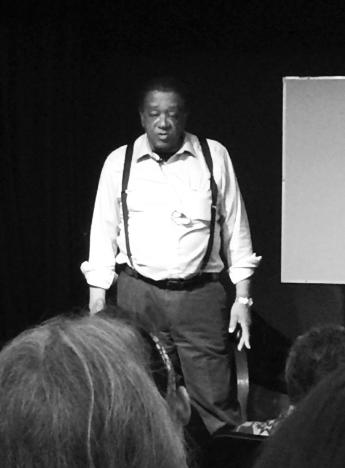“You can start a rally at the drop of a hat”: Black Panthers cofounder Bobby Seale comes to Puget Sound

By Anya Otterson
Recently, the University of Puget Sound has been fortunate enough to host multiple history-makers coming to speak to the campus and surrounding community. Sponsored by the Race and Pedagogy Institute, one of the most recent and revered of these speakers was Bobby Seale, a leader of the Black Panther Party. Seale came to Puget Sound amidst a flurry of activity and spoke to a crowd of almost two hundred people that overflowed Rausch Auditorium.
“Bobby Seale, a cofounder of the Black Panther Party, is a revolutionary and an icon,” Professor Renee Simms of the African American Studies department said, during her introduction to the conversation.
With African American and Communication Studies Professor Dexter Gordon as the moderator, Seale spoke for an hour and a half about his life and the history of the Black Panther Party. Seale’s charisma and vibrant stories captivated the audience’s attention, as he described moments that changed history in such detail it was as though we were reliving them.
Part of a long line of carpenters and builders, Seale grew up in Texas and Berkeley, California. After serving time in the United States Air Force, where he excelled in technical school, Seale attended Merritt College in Oakland, California, where he continued to do extremely well in math and science. It was while he was in college that Seale’s interest in civil rights was sparked, largely in part because of all the books he read.
thing, but I had begin to research to know my African and African American people’s history,” Seale said.
A defining moment for Seale came when he got the opportunity to hear Martin Luther King Jr. speak in Oakland. Along with the African American history books he read, he was strongly influenced by Martin Luther King Jr., and it changed the course of his life.
“When I heard Dr. King, Martin Luther King, was coming to town, I knew he was about changing stuff, so I’m gonna go hear this brother speak,” Seale said.
In 1966, Seale was an employee of the City Government of Oakland when he and Huey Newton started the Black Panther Party. The party evolved out of a poem and a conflict with the police in Berkeley. True to his charismatic and humorous nature, Seale recounted to the audience how Newton convinced him to get on a table and recite Ronald Stone’s poem, “Uncle Sammy Call Me Fulla Lucifer.”
“You gotta remember something,” Seale said, grinning. “This is the 1960s. You can start a rally at the drop of a hat.”
He then promptly stood up from his chair on the stage and recited the poem to the rapt audience. It was easy to see how he was able to start a movement on that day in the 1960s; his voice was so full of power and emotion that it was as though we were there on that Berkeley street with him all those years ago.
Claiming that he was breaking the law by using obscene language in public — something that the First Amendment in fact allows — police attempted to pull him down from the chair on which he stood. Not realizing that they were undercover police, Seale refused to go; they then began attacking him and Newton. At the preliminary hearing, the police lied and stated that they had gone after Seale and Newton for blocking the sidewalk.
In contrast to the negative stereotypes of violence that they are often saddled with, the Black Panthers in fact used their knowledge of laws and history to fight for civil rights. This stems largely from Seale’s love of reading and belief in the importance of education in winning battles.
early 1970s due to internal issues and Seale’s resignation as chairman, he continues to spread the message of fighting for each other’s civil rights and holding the police accountable for their actions.
Emphasizing the vital role that cell phones play in modern politics and activism, Seale explained that anyone could protest or provoke change by recording moments for the rest of the world to see. Often having this photographic evidence can sway public opinion and policy.
“We don’t need the guns. We’re just trying to capture the imagination of the people today,” Seale said.
First-year student Laneka Viney enjoyed hearing Seale speak, especially since it happened to coincide with a book she was reading about him and Newton that she just happened to pick up recently.
“As he talked, I kind of envisioned him as a young person saying those things,” she said.
While she was surprised that Seale did not speak too highly of Newton — he made sure to let the audience know that he was more of a leading force within the party than Newton — Viney connected with his sentiments about not having many black professors at his college, which she has found to be difficult.
First-year student Mauricio Mendez was similarly moved by Seale’s lecture and the intelligence that he exuded.
“Having someone that powerful, someone who was that strong, politically active, someone who I aspire to be one day, it’s just eye opening. It made me feel very inspired,” Mendez said.
Struck by how highly Seale spoke of youth, Mendez was reminded of Berkeley protests that he attended when he was younger and how his mere presence at the protests was a sign of resistance.
“If he could do it I could do it. No matter what, no matter what you’re doing, no matter what happens, keep fighting,” Mendez said.

